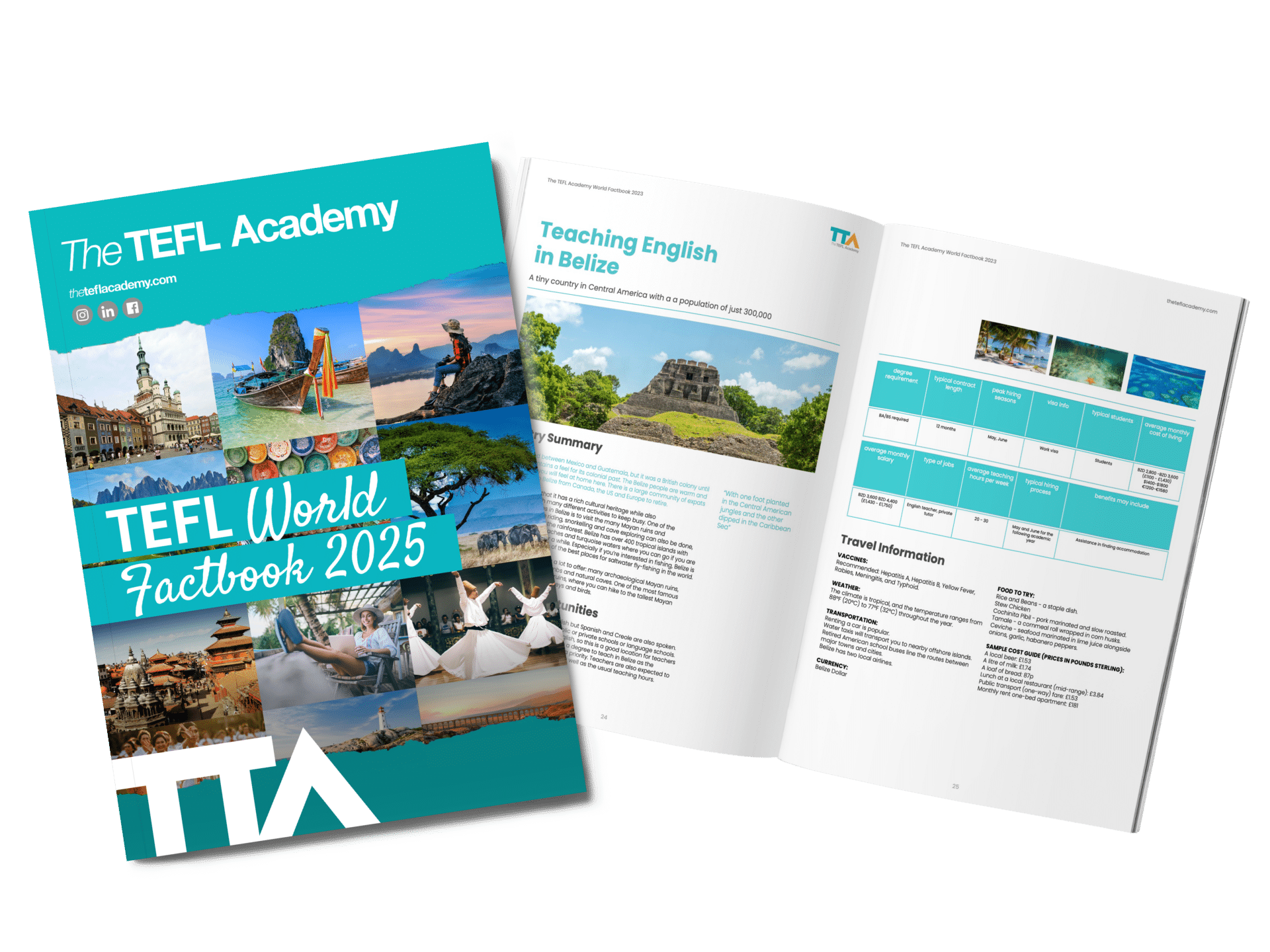Teach English in Singapore
a world of opportunities
Join a global community of over 200,000 TEFL teachers working throughout the world! Enrol me!
Introduction
Why teach in Singapore
Best places to teach
Requirements
Visa requirements
Teaching experience
TEFL certification
Degree requirements
Non-native speakers
Start-up capital
Jobs and programs
How to get a job
Salaries and benefits
Common benefits
Cost of living
Saving opportunities
Life and culture
Singapore is a small island nation, located off of the Malay Peninsula. Many know Singapore as a premier shopping destination in the region, but to label Singapore as only this would be misleading.
One of the three only surviving city-states in the world, Singapore includes 63 islands in addition to its mainland. Most of its islands are uninhabited, but it’s possible to escape from the hustle and bustle of the big city without having to splurge on a plane ticket.
Overall, Singapore offers many opportunities for those looking to work and live in a vibrant and dynamic city-state.
Why teach English in Singapore?
- Singapore is one of the safest and cleanest countries to work in. This is due to the tough laws and fines enacted on those who drop litter or cross at traffic lights when they are red. Chewing gum is also banned.
- Singapore is financially prosperous, being one of Asia’s four economic powerhouses.
- There are opportunities to teach English, but they are not immediately obvious as in other Asian countries such as Thailand or Cambodia.
- As in Malaysia, EFL teachers from abroad face fierce competition with local English-speaking residents. The Ministry of Education, however, is open to hiring overseas applicants to bring new perspectives to the country.
Best places to teach English in Singapore
As a city-state, there’s only one city to teach in: Singapore!
Opportunities abound in state and private institutions. Jobs are generally available all year round, but for Ministry of Education jobs training begins in July for jobs starting in January.
Singapore
A modern, tropical capital
Multicultural and lush, Singapore offers both the convenience of city living and the peacefulness of green spaces.
In Singapore, you’ll find teaching opportunities in language schools, international schools, and businesses offering English courses for professionals. Singapore is a popular destination for business professionals and expat families with children.
Requirements and qualifications
If you’re looking to work in Singapore, there are a few things you should know about the job market there. Firstly, a Bachelor’s degree is typically required for most jobs, whether you’re looking to work in business or another field.
The typical contract length is around 12 months, and peak hiring seasons occur all year round, with the exception of state jobs. If you’re coming from another country, you’ll need to secure a work visa in advance.
A police check and medical check are required for a visa application.
Do you need a visa for teaching English in Singapore?
Yes, you need a work visa to teach English in Singapore. This working visa is known as an Employment Pass. It is organised by your employer once you have signed your job contract.
Do I need teaching experience to teach in Singapore?
Teaching experience is preferred for TEFL positions in Singapore due to the competitive nature of TEFL jobs.
Which TEFL certificate do I need to teach in Singapore?
Education is a priority in Singapore. Because of this, only experienced and qualified EFL teachers will be able to find teaching positions here. A Level 5 TEFL certificate is the minimum TEFL qualification required for TEFL jobs in Singapore.
Of the utmost importance is to ensure your TEFL qualification is accredited by reputable organisations. Your TEFL course provider should be well-known and internationally recognised.
Can I teach English in Singapore with no degree?
No. Singapore is a highly educated country and expects a lot from its teachers. A Bachelor’s degree is needed to teach English in Singapore. Degrees in Education or Linguistics are preferred.
Can non-native speakers teach English in Singapore?
Yes, but native speakers from the US, the UK, Ireland, Canada, Australia, New Zealand or South Africa are preferred.
How much start-up capital do I need?
Here are a few costs you need to consider when starting out in Singapore:
- Accommodation: First month’s rent and security deposit.
- TEFL certification: A TEFL course can cost between $100 and $500, depending on the length and level of the course and the course provider.
- Document fees: Any costs related to certifying and notarising your degree and TEFL certificate.
- Flight ticket: Variable.
- Visa application: The cost of a visa is subject to your home country. You can expect to pay between $100 and $150.
- Living expenses: You will need one month’s worth of start-up capital of about S$ 1,600 – S$ 2,000 ($1,200 – $1,500).
Jobs and programs
Public schools, private international schools and private language schools are the name of the game in Singapore. For the more qualified and experienced TEFL teacher, university positions might be an option.
Types of teaching jobs in Singapore
Private language schools
Language schools cater mostly for adult learners. You can expect small, well-resourced classrooms.
Public schools
Teachers who want to work in a public school in Singapore need to get approval from the Ministry of Education. They must be willing to sign a 12-month contract with the school. It’s possible to teach English as a Foreign Language or teach another subject through English.
International schools
International schools in Singapore offer the highest salaries for jobs teaching English. Post-graduate degrees are preferred.
Private lessons
Private tutoring is common for TEFL teachers in Singapore to bump up their monthly income. Private students are usually adults who require Business English.
How to get a job teaching English in Singapore
The majority of TEFL jobs in Singapore are found remotely. Employers conduct numerous rounds of rigorous interviews over the phone and video chat. Once a contract has been signed, the employer organises the Employment Pass before the teacher makes their way to Singapore.
Public school positions can be found through the Ministry of Education’s website.
Salaries and benefits
There are a variety of teaching opportunities in Singapore for English teachers. Your salary will differ based on which teaching route you choose to follow. The cost of living is high, but the average monthly salary in Singapore is also quite high, which can help offset the cost of living. Taxes are low which helps to stretch your salary.
What is the average teaching English salary in Singapore?
- The average salary of a TEFL teacher in Singapore ranges between S$ 2,500 to S$ 5,500 ($1,800 to $4,000) a month.
- Private language schools pay S$20 – S$50 ($15 – $35) an hour.
- In public schools, teachers can earn S $1,500 – S $3,000 ($1,100 – $2,200).
- International schools pay up to S$12,000 ($8,500) a month.
- For private lessons, TEFL teachers usually charge S$20 – S$50 ($15 – $35) an hour.
What are the common benefits for teachers in Singapore?
For private schools for long-term contracts, benefits can include a relocation allowance. Other contracts offer a return flight.
Other benefits can include:
- Housing or a housing allowance
- Health care
- Paid holiday (up to 12 weeks!)
Cost of living in Singapore
Singapore is considered the second most expensive city in the world, not far behind the number one city Hong Kong.
The cost of living in Singapore is relatively high, with an average monthly cost of living ranging from $ 2,500 to 3,500 ($1,800 to $3,500).
One of the biggest issues facing potential teachers is the cost of living. Rent is a major expense for teachers, but online forums often have solutions for shared accommodation. Therefore it is important to begin applying a couple of months before your arrival in Singapore to secure a job before you leave your country.
Transport and food on the other hand are cheap, which means you can live comfortably.
What is the cost of living in Singapore?
Here are some of the usual costs for living in Singapore.
Accommodation
- A one-bedroom apartment in the city centre: S$ 3,500 ($2,500) a month
- A one-bedroom apartment outside the city centre: S$ 2,700 ($2,000) a month
Utilities
- Electricity, water, and gas: S$200 ($150) a month
Food and groceries
- Monthly shop: S$225 ($160)
- Meal at an inexpensive restaurant: S$15 ($10)
Transport
- Monthly travel pass: S$130 ($95)
- One-way ticket: S$1.50 ($1.10)
Internet
- Unlimited: S$50 ($37)
Entertainment
- Gym, cinema, clubbing: S$250 ($185) a month
Is it possible to save as a TEFL teacher in Singapore?
Even though it’s well-known for its high cost of living, it is surprisingly easy to save money in Singapore. Here’s how:
- If accommodation isn’t provided by your employer, try to share accommodation with other teachers or expats.
- Use public transport. Even better, travel before rush hour to enjoy pre-peak discounts.
- Take advantage of the many free tourist attractions around the city.
- Find out when happy hour is for your favourite hang outs.
Life and culture in Singapore
- Culturally, Singapore is a mix of Chinese, Malayans, Indians and expats from around the world. This is reflected in the colonial architecture in Singapore City, Little India and China Town, Thian Hock Keng (the oldest Buddhist temple) and the vibrant colours of Sri Mariamman (a Hindu temple).
- Singapore is easy to explore. It’s only a third the size of London!
- Apart from the architecture and culture, Singapore is famous for its world-renowned orchids. These can be seen at the National Orchid Garden. It is possible to explore beautiful reservoirs and to experience treetop walks above the lush rainforest canopies.
- There are four official languages in Singapore. These are Chinese, Malay, Tamil and English. English is seen as the working language of the country and is important for financial trade and tourism.
- You may be surprised to know that several islands are accessible just off the mainland. Pulau Ubin is a very popular escape for locals. If you want to be transported back to Singapore in the 60s, take a bumboat from Changi Jetty and explore the rustic roads and rocky shores of Ubin.
- For those wanting more amenities look no further than the island resort of Sentosa. Sandy beaches are lined with food stalls, bars and palm trees. Other attractions include Universal Studios Singapore, S.E.A Aquarium, golf courses, and a casino.
- Spiritual travellers will find a tranquil break at Kusu Island. Steeped in local myth and folklore the island is said to be formed by a tortoise which transformed itself into the island to save men who were shipwrecked. Visit the sacred sites of Da Bo Gong Temple or snorkel in the swimming lagoons and beaches.
- Singaporean students are often highly motivated and enthusiastic to learn.
Start your teaching journey with a certified TEFL course provider!
Introduction
Singapore is a small island nation, located off of the Malay Peninsula. Many know Singapore as a premier shopping destination in the region, but to label Singapore as only this would be misleading.
One of the three only surviving city-states in the world, Singapore includes 63 islands in addition to its mainland. Most of its islands are uninhabited, but it’s possible to escape from the hustle and bustle of the big city without having to splurge on a plane ticket.
Overall, Singapore offers many opportunities for those looking to work and live in a vibrant and dynamic city-state.
Why teach English in Singapore?
- Singapore is one of the safest and cleanest countries to work in. This is due to the tough laws and fines enacted on those who drop litter or cross at traffic lights when they are red. Chewing gum is also banned.
- Singapore is financially prosperous, being one of Asia’s four economic powerhouses.
- There are opportunities to teach English, but they are not immediately obvious as in other Asian countries such as Thailand or Cambodia.
- As in Malaysia, EFL teachers from abroad face fierce competition with local English-speaking residents. The Ministry of Education, however, is open to hiring overseas applicants to bring new perspectives to the country.
Best places to teach English in Singapore
As a city-state, there’s only one city to teach in: Singapore!
Opportunities abound in state and private institutions. Jobs are generally available all year round, but for Ministry of Education jobs training begins in July for jobs starting in January.
Singapore
A modern, tropical capital
Multicultural and lush, Singapore offers both the convenience of city living and the peacefulness of green spaces.
In Singapore, you’ll find teaching opportunities in language schools, international schools, and businesses offering English courses for professionals. Singapore is a popular destination for business professionals and expat families with children.
Requirements and qualifications
If you’re looking to work in Singapore, there are a few things you should know about the job market there. Firstly, a Bachelor’s degree is typically required for most jobs, whether you’re looking to work in business or another field.
The typical contract length is around 12 months, and peak hiring seasons occur all year round, with the exception of state jobs. If you’re coming from another country, you’ll need to secure a work visa in advance.
A police check and medical check are required for a visa application.
Do you need a visa for teaching English in Singapore?
Yes, you need a work visa to teach English in Singapore. This working visa is known as an Employment Pass. It is organised by your employer once you have signed your job contract.
Do I need teaching experience to teach in Singapore?
Teaching experience is preferred for TEFL positions in Singapore due to the competitive nature of TEFL jobs.
Which TEFL certificate do I need to teach in Singapore?
Education is a priority in Singapore. Because of this, only experienced and qualified EFL teachers will be able to find teaching positions here. A Level 5 TEFL certificate is the minimum TEFL qualification required for TEFL jobs in Singapore.
Of the utmost importance is to ensure your TEFL qualification is accredited by reputable organisations. Your TEFL course provider should be well-known and internationally recognised.
Can I teach English in Singapore with no degree?
No. Singapore is a highly educated country and expects a lot from its teachers. A Bachelor’s degree is needed to teach English in Singapore. Degrees in Education or Linguistics are preferred.
Can non-native speakers teach English in Singapore?
Yes, but native speakers from the US, the UK, Ireland, Canada, Australia, New Zealand or South Africa are preferred.
How much start-up capital do I need?
Here are a few costs you need to consider when starting out in Singapore:
- Accommodation: First month’s rent and security deposit.
- TEFL certification: A TEFL course can cost between $100 and $500, depending on the length and level of the course and the course provider.
- Document fees: Any costs related to certifying and notarising your degree and TEFL certificate.
- Flight ticket: Variable.
- Visa application: The cost of a visa is subject to your home country. You can expect to pay between $100 and $150.
- Living expenses: You will need one month’s worth of start-up capital of about S$ 1,600 – S$ 2,000 ($1,200 – $1,500).
Jobs and programs
Public schools, private international schools and private language schools are the name of the game in Singapore. For the more qualified and experienced TEFL teacher, university positions might be an option.
Types of teaching jobs in Singapore
Private language schools
Language schools cater mostly for adult learners. You can expect small, well-resourced classrooms.
Public schools
Teachers who want to work in a public school in Singapore need to get approval from the Ministry of Education. They must be willing to sign a 12-month contract with the school. It’s possible to teach English as a Foreign Language or teach another subject through English.
International schools
International schools in Singapore offer the highest salaries for jobs teaching English. Post-graduate degrees are preferred.
Private lessons
Private tutoring is common for TEFL teachers in Singapore to bump up their monthly income. Private students are usually adults who require Business English.
How to get a job teaching English in Singapore
The majority of TEFL jobs in Singapore are found remotely. Employers conduct numerous rounds of rigorous interviews over the phone and video chat. Once a contract has been signed, the employer organises the Employment Pass before the teacher makes their way to Singapore.
Public school positions can be found through the Ministry of Education’s website.
Salaries and benefits
There are a variety of teaching opportunities in Singapore for English teachers. Your salary will differ based on which teaching route you choose to follow. The cost of living is high, but the average monthly salary in Singapore is also quite high, which can help offset the cost of living. Taxes are low which helps to stretch your salary.
What is the average teaching English salary in Singapore?
- The average salary of a TEFL teacher in Singapore ranges between S$ 2,500 to S$ 5,500 ($1,800 to $4,000) a month.
- Private language schools pay S$20 – S$50 ($15 – $35) an hour.
- In public schools, teachers can earn S $1,500 – S $3,000 ($1,100 – $2,200).
- International schools pay up to S$12,000 ($8,500) a month.
- For private lessons, TEFL teachers usually charge S$20 – S$50 ($15 – $35) an hour.
What are the common benefits for teachers in Singapore?
For private schools for long-term contracts, benefits can include a relocation allowance. Other contracts offer a return flight.
Other benefits can include:
- Housing or a housing allowance
- Health care
- Paid holiday (up to 12 weeks!)
Cost of living in Singapore
Singapore is considered the second most expensive city in the world, not far behind the number one city Hong Kong.
The cost of living in Singapore is relatively high, with an average monthly cost of living ranging from $ 2,500 to 3,500 ($1,800 to $3,500).
One of the biggest issues facing potential teachers is the cost of living. Rent is a major expense for teachers, but online forums often have solutions for shared accommodation. Therefore it is important to begin applying a couple of months before your arrival in Singapore to secure a job before you leave your country.
Transport and food on the other hand are cheap, which means you can live comfortably.
What is the cost of living in Singapore?
Here are some of the usual costs for living in Singapore.
Accommodation
- A one-bedroom apartment in the city centre: S$ 3,500 ($2,500) a month
- A one-bedroom apartment outside the city centre: S$ 2,700 ($2,000) a month
Utilities
- Electricity, water, and gas: S$200 ($150) a month
Food and groceries
- Monthly shop: S$225 ($160)
- Meal at an inexpensive restaurant: S$15 ($10)
Transport
- Monthly travel pass: S$130 ($95)
- One-way ticket: S$1.50 ($1.10)
Internet
- Unlimited: S$50 ($37)
Entertainment
- Gym, cinema, clubbing: S$250 ($185) a month
Is it possible to save as a TEFL teacher in Singapore?
Even though it’s well-known for its high cost of living, it is surprisingly easy to save money in Singapore. Here’s how:
- If accommodation isn’t provided by your employer, try to share accommodation with other teachers or expats.
- Use public transport. Even better, travel before rush hour to enjoy pre-peak discounts.
- Take advantage of the many free tourist attractions around the city.
- Find out when happy hour is for your favourite hang outs.
Life and culture in Singapore
- Culturally, Singapore is a mix of Chinese, Malayans, Indians and expats from around the world. This is reflected in the colonial architecture in Singapore City, Little India and China Town, Thian Hock Keng (the oldest Buddhist temple) and the vibrant colours of Sri Mariamman (a Hindu temple).
- Singapore is easy to explore. It’s only a third the size of London!
- Apart from the architecture and culture, Singapore is famous for its world-renowned orchids. These can be seen at the National Orchid Garden. It is possible to explore beautiful reservoirs and to experience treetop walks above the lush rainforest canopies.
- There are four official languages in Singapore. These are Chinese, Malay, Tamil and English. English is seen as the working language of the country and is important for financial trade and tourism.
- You may be surprised to know that several islands are accessible just off the mainland. Pulau Ubin is a very popular escape for locals. If you want to be transported back to Singapore in the 60s, take a bumboat from Changi Jetty and explore the rustic roads and rocky shores of Ubin.
- For those wanting more amenities look no further than the island resort of Sentosa. Sandy beaches are lined with food stalls, bars and palm trees. Other attractions include Universal Studios Singapore, S.E.A Aquarium, golf courses, and a casino.
- Spiritual travellers will find a tranquil break at Kusu Island. Steeped in local myth and folklore the island is said to be formed by a tortoise which transformed itself into the island to save men who were shipwrecked. Visit the sacred sites of Da Bo Gong Temple or snorkel in the swimming lagoons and beaches.
- Singaporean students are often highly motivated and enthusiastic to learn.
Start your teaching journey with a certified TEFL course provider!

Download the World TEFL Factbook
We have created a unique TEFL World Factbook of teaching abroad guides in over 100 countries to help TEFL teachers decide where in the world to teach English. Each country profile outlines everything a TEFL teacher would need to know including average pay, living costs, working environments and even the weather!
Download TEFL Factbook
TEFL Jobs In Asia
View AllOther Places In Asia
View AllTeach English Abroad Articles
View All-
 Teach and Travel
Teach and TravelThings To Know About South Korean Classroom Culture
2025-07-10
-
 Resources
ResourcesTeaching On Wall Street English: What You Need To Know
2025-06-30
-
 Resources
ResourcesAwesome English Idioms For EFL Learners – And How To Teach Them
2025-06-27
-
 Teaching English Abroad Jobs
Teaching English Abroad JobsNavigating Culture Shock: My Real Experience Teaching English In Vietnam
2025-06-20
-
 Teach and Travel
Teach and TravelThings To Know About Chinese Classroom Culture
2025-06-15
-
 Teaching Online
Teaching OnlineOnline Teaching Platforms You Need To Know
2025-06-13
 United Kingdom
UK
United Kingdom
UK









































